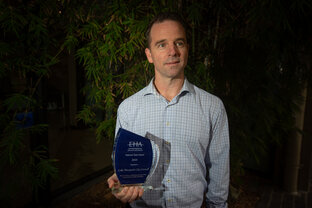A NSW council’s initiative to address hoarding has been so successful it’s being adopted in LGAs across Australia.

Lake Macquarie City Council says its been fielding inquiries from more than 50 councils across the nation since its Hoarding and Squalor Framework took out a National Environmental Health Australia award at the International Federation of Environmental Health Congress in May.
Manager Environmental Regulation and Compliance Derek Poulton says council noted a 55 per cent increase in hoarding and squalor cases during COVID-19 lockdowns in 2020, and cases have remained high since restrictions eased.
“At any one time could be dealing with more than 20 cases across the LGA,” he said.
The trend isn’t confined to the Lake Macquarie LGA, he says.
Penalties not the solution
Historically, councils and other authorities have taken a strictly regulatory approach to hoarders, but Mr Poulton says removal orders and penalty infringements are easily ignored and don’t attack the problem form the root.
Under the new framework, Council staff assess not only the condition of the property, but the willingness and capability of the resident to seek help.
This has meant shifting to a ‘good cop’ approach of encouraging hoarders to seek long-term solutions with health professionals, psychological services and community groups like Samaritans and the Salvation Army, rather than the ‘bad cop’ approach of walking in and issuing fines and warnings.
“We realised a more effective and compassionate approach would balance the wellbeing of people living in these conditions with the impact on the community and our regulatory requirements,” Mr Poulton said.
“It represents a significant step in addressing a complex and challenging social, environmental and public health issue – one that not only helps the people living in these conditions but the entire community.”
Lake Macquarie Mayor Kay Fraser says Council developed the framework after consultation with the Mental Health Hotline, Catholic Care, the NSW Government’s Family and Community Services, NSW Police and NSW Fire and Rescue.
“This framework empowers our Environmental Health Officers to effectively assist the community in improving health and well-being for individuals, their families, and the broader community,” she said.
“Dozens of other councils right across Australia are now poised to adopt this approach.”
Serious mental illness
Macquarie University hoarding expert Professor Melissa Norberg says hoarding disorder is a serious mental illness that can get worse with age.

It affects about 2.5 per cent of the adult population and seven per cent of older adults.
“We don’t exactly know what causes hoarding. It seems to be about 50 per cent genetics and 50 per cent environmental,” Professor Norberg said.
“Psychologists, support groups, occupational therapists, professional organisers, cleaners, housing authorities, and legal professionals may all need to collaborate to help someone with hoarding issues.”
Hoarding disorder is defined as a difficulty in discarding possessions, leading to so much clutter that it makes a person’s home or parts of it unusable except for storage.
Squalor refers to a condition that is unhygienic through neglect or the collection of waste items that pose a health and safety risk to residents.
Mr Poulton says individual cases of hoarding are different and it’s unlikely that any two cases will be treated in exactly the same manner.
“This framework helps put us on the path to achieve a positive outcome for everyone involved,” he said.





My Brother in Law is the executor of his and his siblings estate , he has cluttered up his parents house and has made little effort to get it ready for sale as it is now almost 2 years since their mother passed away , but it appears that unless he can be persuaded to seek mental health himself there is little that my wife and sister can do about it unless a complaint is made to the supreme court of South Australia to seek to have him removed as executor and to get him forcebly removed from the house .
This would be a very costly excercise as well as almost certainly creating a family rift.If councils are addressing the problem of hoarding and squalor it must be a good thing . Do we have to watch him and the house descend into total Squalor before the authorities are able to be called in or is there a way to get an assessment made before things deteriorate even more ?
Squalor refers to a condition that is unhygienic through neglect or the collection of waste items that pose a health and safety risk to residents.